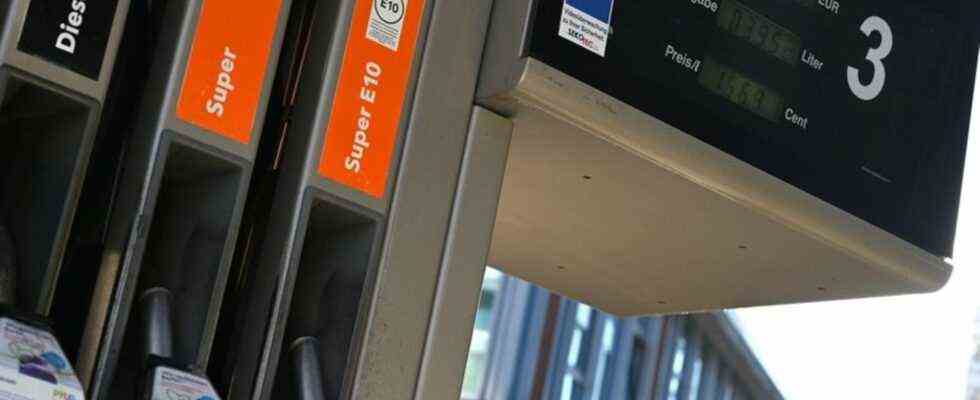questions and answers
Why is fuel so expensive?
Four taps labeled Diesel, Super and Super 10 are in the pump at a petrol station. (Archive image) Photo: Monika Skolimowska / dpa-Zentralbild / dpa
© dpa-infocom GmbH
Petrol prices have been rising for months – but what are they doing and how much does the state get? Answers to important questions about petrol and diesel.
Diesel is more expensive than ever at the pump, and premium gasoline is approaching its all-time high. But how do the fuel prices come about, what role does the CO2 price play and will fuel soon cost 2 euros? Answers to key questions.
Why is fuel becoming more and more expensive at the moment?
The cause lies primarily in the rising oil price. It has roughly doubled within a year and reached multi-year highs on Monday. The Brent variety, which is important for Europe, was valued at around 86 dollars per barrel (159 liters). The long-term increase in oil is due to the global economic recovery after Corona. For a few weeks now there have also been concerns about a supply deficit. With diesel there is also a seasonal component, as the demand for the very similar heating oil typically also picks up in autumn.
How is the fuel price made up?
A large part of the price of fuel is made up of taxes and duties. The energy or mineral oil tax amounts to 65.45 cents per liter for premium petrol and 47.07 cents for diesel. Added to this is the value added tax – at the current price level this is just under 27 cents for the Super E10 and around 25 cents for diesel.
The CO2 price that has been incurred since the beginning of the year creates additional costs. Depending on how high the proportion of biofuel is, that is – still without VAT – a good 5 cents for Super E10 and a good 6 cents for diesel. The rest is divided into the price of crude oil and costs for further processing, transport, filling stations and the profit of the mineral oil industry. However, the latter recently emphasized that their margins had not increased.
Why is diesel cheaper than gasoline?
The decisive factor is the difference in mineral oil and energy tax. Including VAT, that is theoretically just under 22 cents. Because the prices for diesel and premium gasoline in the wholesale trade fluctuate depending on demand, the price difference at the petrol station differs significantly from this in some cases.
Will gasoline soon cost two euros?
That is rather unlikely – at least as long as there are no additional price drivers beyond the oil price. If the exchange rate of the dollar remains constant, the oil price would have to rise well over 100 dollars for an average E10 price of two euros, says ADAC expert Jürgen Albrecht. Such an increase is unlikely, says Albrecht: The Opec + association has little interest in allowing prices to rise any further. In addition, this would also make the funding method fracking more attractive, which would also slow down prices through an increase in supply.
However, this does not rule out the possibility that individual petrol stations charge more than two euros per liter of Super at certain times. On the one hand, there are numerous other, usually more expensive varieties in addition to the Super E10 observed by the ADAC. In addition, fuel prices fluctuate significantly depending on the time, region and petrol station. It is typically cheapest to refuel in the evening, and most expensive in the morning rush hour.

